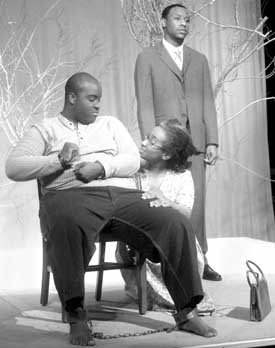Loyola’s production of “A Lesson Before Dying,” based on the novel by Ernest J. Gaines, combined powerful acting with a simple set.
The play follows one teacher’s struggle to teach a lost boy how to die like a man.
“I was not there, yet I was there,” says Grant Wiggins (Dasen Kendrick, drama and chemistry senior).
Grant is a university-educated black schoolteacher in Bayonne, La., where Jefferson (Darryl McDonald, theatre arts sophomore), an illiterate black man, has been falsely convicted of murder and sentenced to die in the electric chair. Grant struggles with the racism and lack of education in Bayonne.
He also feels deep duty to his community, fueled by his girlfriend, Vivian Baptiste (Susaye Lawson, communications senior), who tells him he can’t run from his problems.
The actors seemed to have a solid understanding of the play’s thematic elements, and they seemed to identify with the characters’ personalities and internal conflicts.
The set was a single room. This room was at times the “storeroom” in the courthouse where the meetings take place and where Jefferson dies, a house, a restaurant and a classroom.
Twelve white men in chairs ranged above either side of the stage.
They seemed to symbolize the twelve members of a jury, and perhaps the looming presence of white men over the black community.
At Jefferson’s trail, his lawyer calls him a hog, dehumanizing him in an attempt to save his life by decreeing Jefferson too inhuman to kill.
Though Miss Emma (Eritria Pitts, broadcast production senior), Jefferson’s godmother, knows it is too late to save Jefferson’s life, she wants him to die like a man.
She begs Grant to visit Jefferson in his cell and teach him why and how he should die with pride and dignity.
“[Dignity] is for youmans,” Jefferson says, “not hogs.”
Throughout the play, the character of Grant stands in the middle of the stage, facing only the audience.
Grant has become so frustrated and ashamed of his inability to help his community that he says, “I can’t face anyone [here].”
In one accented scene, he stands facing front, as the white sheriff, Sam Guidry (Matthew Azcona, general studies sophomore), ridicules him.
Grant is hesitant to meet with Jefferson because Grant does not feel that he will be able to teach Jefferson to “die like a man.”
Grant struggles with his own understanding of duty and pride.
He also is an atheist, which is why Reverend Ambrose (Jason Smith, theatre arts junior) thinks that Grant is unqualified to guide Jefferson before his death.
Grant begins by teaching Jefferson that while he is a prisoner of an unjust system, he does not have to be what that system thinks he is.
“I want you to show them the difference between what they think you are and what you can be.”
Grant teaches Jefferson to see the little things — the square of sky outside his window, listening to the radio, the scent of perfume — that separate men from animals.
Grant tells Jefferson that the “white man” does not think that Jefferson, or any black person, can be a man.
“If you die like a hog, the white man will be right. Do you want Sheriff Guidry to be right?” he asks.
Grant buys Jefferson a radio so he can listen to the world, and a notebook so he can write down his thoughts.
Through writing, Jefferson comes to realize just how much of the world he sees and loves.
As Jefferson’s execution draws near, more people come to visit him. He begins to see that he has become more than one man; he has become a symbol of the whole persecuted, scapegoated black community.
When Jefferson’s execution day arrives, he has come to understand that if he dies like a man, he will be standing tall for the whole community.
“Goodbye Mr. Wiggins. Tell them I’m strong. Tell them I’m a man,” Jefferson writes in his notebook.
The play deals with recognizing injustice and battling it.
Both Grant and Jefferson have to face their responsibilities and pasts.
The play also explores the potential inherent in death. Jefferson, while leading an unremarkable life, has the potential to make an important statement with his death.
After the execution, Deputy Paul Bonin (Scott Prather, broadcast production junior) comes to tell Grant that Jefferson is dead.
“He walked to the chair… He was the bravest man in the room.”
The play runs again tonight and tomorrow night at 8 p.m. in the Marquette Theatre. Tickets are $10 for general admission and $7 for students and senior citizens.

Miss Emma (Pitts) refuses to acknowledge Grant Wiggins’(Kendrick) reluctance to teach her godson Jefferson (McDonald) dignity and pride. (Loyola)







